10 Best Java Books to Skyrocket Your Java Skills (Spring 2023)
Do you know that Java initially was named “Oak”? This way the developers wanted to show that the language they were creating was strong and would be able to withstand the test of time. However, this name was already taken, so they named the language “Java” after the coffee they drank while working on it.
We reviewed 30 products to find 10 best Java books. The Effective Java by Joshua Bloch was chosen as our Editor’s Choice. Making our selection, we focused on how well the book explains the key Java concepts. We also looked for books that include challenging exercises to help readers practice what they’ve learned. We included both introductory and advanced Java books so that everyone can find something suitable. Besides, we paid attention to whether the book is interesting to read and if it covers the latest Java releases.
| Name | Nomination | Overall rating |
|
This book is a must-have resource for every Java developer. It is an indispensable guide that will help you avoid many of the pitfalls and traps associated with using this complex programming language |
Editor’s Choice | 9.9 |
|
2. JavaScript: The Definitive Guide Packed with expert advice and practical examples, the book is the authoritative resource for intermediate JavaScript developers |
Best for Intermediate | 9.8 |
|
3. Java: Programming Basics for Absolute Beginners This book introduces you to the basics of Java programming helping to get started in your journey towards becoming a professional Java programmer |
Best for Beginners | 9.7 |
|
4. Java: Learn Java in One Day and Learn It Well With this book, you don’t have to spend a fortune to quickly and effectively master Java even if you have no prior knowledge of computer programming |
Best Value | 9.6 |
|
5. Elements of Programming Interviews in Java With this comprehensive collection of 300 programming questions and solutions, an interview will be a breeze |
Best for Interview Preparation | 9.5 |
|
This book is a comprehensive guide with a practical, hands-on approach to the Java language and its use in modern application development |
Best for Practice | 9.4 |
|
7. Java: The Complete Reference This book is a complete, authoritative, and up-to-date Java reference covering all major topics in depth |
Best Reference Book | 9.3 |
|
The book is the perfect resource for experienced Java developers looking to take their skills to the next level |
Best for Experienced | 9.2 |
|
This is the perfect resource for anyone looking to gain a solid understanding of the Java language. You’ll learn how to write superior code that is both effective and elegant |
Best Core Java Book | 9.1 |
|
10. Head First Java: A Brain-Friendly Guide Thanks to the visual approach and easy-to-understand language, this book is a fun and entertaining way of learning the Java programming language |
Best for Visual Learners | 9.0 |
Top 10 Java Books Review 2022
Features:
- Author: Joshua Bloch
- Publisher: Addison-Wesley Professional
- Publication date: December 27, 2017
- Edition: 3rd
- Print length: 416 pages
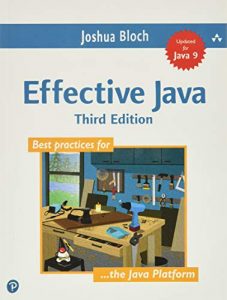
Effective Java by Joshua Bloch was chosen as our Editor’s Choice because it is a comprehensive guide to mastering the Java programming language. This book will teach you how to avoid the traps and pitfalls of commonly misunderstood subtleties of the language. This concise and clear guide is packed with in-depth descriptions and explanations for each section, as well as useful examples. You’ll learn how to design effective Java code using Lambda, streams, generics, collections, and Java 9 features. Get updated on classic topics such as objects, classes, libraries, methods, and serialization – all written in a concise and clear style.
The Effective Java book thoroughly explains all you need to know about the subtleties of the language, but it is not ideal for beginners like Java: Programming Basics for Absolute Beginners, which we will have third on our list. Effective Java explains the different ways you can use the language, but you will need to have some background in how it works first, or the book will be confusing. It also covers the different libraries of Java that you can use to your advantage.
What we liked
- Covers Lambda, streams, generics, collections, and Java 9 features;
- In-depth descriptions and explanations for each section help you understand what to do, what not to do, and why;
- Get updated on classic topics such as objects, classes, libraries, methods, and serialization;
- Written in a concise and clear style;
- Useful examples;
- Contains information on design patterns.
What could be better
- Not for absolute beginners.
Features:
- Author: David Flanagan
- Publisher: O’Reilly Media
- Publication date: June 23, 2020
- Edition: 7th
- Print length: 704 pages
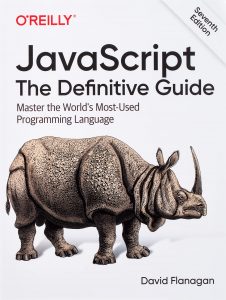
JavaScript: The Definitive Guide by David Flanagan is the best Java programming book for intermediate developers. The author covers types, values, variables, expressions, operators, statements, objects, and arrays. You’ll also learn about functions, classes, modules, and iterators. Plus, you will get a comprehensive overview of the web platform, and Node.js. With this book, you’ll have everything you need to write powerful, high-quality JavaScript code.
JavaScript: The Definitive Guide is quite similar to the Effective Java book that we named as our Editor’s Choice, as both books require you to have a background in the language. But, this book is better suited for intermediate developers that have passed the beginner’s stage and are well-learned about the basics of JavaScript. It also covers more topics like Node.js, JavaScript tools, and language extensions. If you want to expand your knowledge of JavaScript, this book is an ideal choice for you.
What we liked:
- Includes classes, modules, iterators, generators, promises, async/await, and metaprogramming;
- Excellent code examples;
- Thorough and detailed content.
What could be better:
- Not beginner-friendly;
- Some buyers note that it is more a reference than a how-to book.
Features:
- Author: Nathan Clark
- Publisher: CreateSpace Independent Publishing Platform
- Publication date: October 10, 2017
- Edition: 2nd
- Print length: 115 pages
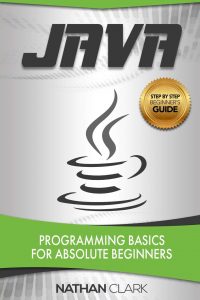
If you want to start learning Java programming, Java: Programming Basics for Absolute Beginners is the book for you. Written by Nathan Clark, an expert programmer with over 20 years of experience, this guide takes you step-by-step through the basics of Java. You’ll learn how to write your first program, use data types and variables, create loops, decision structures, and more. Plus, you’ll get tips on choosing an IDE and using the Java Development Kit. By the end of this book, you’ll be ready to start writing your own Java applications.
If you’re looking for a book that will help you write your first program, you can go for the Java: Programming Basics for Absolute Beginners book. Unlike Java: The Definitive Guide, which is our best choice for intermediate coders, this book gives beginners all they need to know to get started for the first time. There are also different tips that will be helpful to a new coder. It is the first book that a coder should read and understand before going for the intermediate option.
What we liked:
- Low price;
- Simple and step-by-step learning Java;
- Explanation of Java Development Kit, Java Runtime Environment, and choosing an IDE;
- A great number of practical examples;
- Teaching to write your first program.
What could be better:
- Short.
Features:
- Author: Jamie Chan
- Publisher: Independently published
- Publication date: May 9, 2022
- Edition: 2nd
- Print length: 228 pages
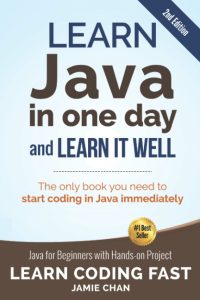
Learn Java in One Day and Learn It Well is an affordable book that teaches the fundamentals of Java programming language. Written for beginners, this book will help you to understand the basic concepts of object-oriented programming using Java. The book is written in simple English and contains many examples to make it easy for anyone with no prior knowledge of computer programming or any other technical field to learn how to program in Java within a short period. This book covers all the topics that are essential for understanding Java from scratch, including data types, operators, and control flow statements.
Learn Java in One Day and Learn It Well is also written for beginners like the Java: Programming Basics for Absolute Beginners book which we placed in the third position on our list. But, if you are looking to purchase your book on a budget, then this one is an ideal choice for you. Despite having a similar number of pages, Learn Java in One Day and Learn It Well has a more reasonable price, so if you are working with a budget, this is an ideal choice.
What we liked:
- Simple presentation of the material;
- Perfect for absolute beginners;
- Medium size;
- Up-to-date;
- Project-based;
- Bright examples;
- Reasonable price.
What could be better:
- Some buyers have complaints about the quality of the paper and binding.
Features:
- Author: Amit Prakash, Adnan Aziz, Tsung-Hsien Lee
- Publisher: CreateSpace Independent Publishing Platform
- Publication date: October 6, 2015
- Edition: 2nd
- Print length: 492 pages
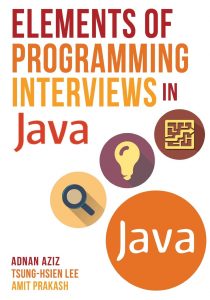
Elements of Programming Interviews in Java is a collection of 300 problems with detailed solutions. It covers data structure, algorithms, and problem-solving techniques that will help you crack the most challenging interview. The book starts with a summary of patterns for data structure, algorithms, and problem-solving that will help you solve the most difficult interview questions. This is followed by chapters on basic and advanced data structures, algorithm design, concurrency, system design, probability, and discrete mathematics.
Elements of Programming Interviews in Java is quite similar to the Effective Java book which we named our Editor’s Choice, as both are helpful resources to those that are using Java. But, the latter focuses more on the general things that you need to learn about Java while the former is narrowed down to focus on interviews. It’s an indispensable resource for developers that want to get started with the company of their dreams after learning the language, so you cannot read this book as a beginner.
What we liked:
- Helps to solve real computing problems presented as interview questions;
- Contains useful tips on how to have a successful interview;
- Describes common interview mistakes;
- Practical approach.
What could be better:
- Some buyers say the explanations are sometimes complicated.
Features:
- Author: Raoul-Gabriel Urma, Mario Fusco, Alan Mycroft
- Publisher: Manning
- Publication date: November 15, 2018
- Edition: 2nd
- Print length: 592 pages
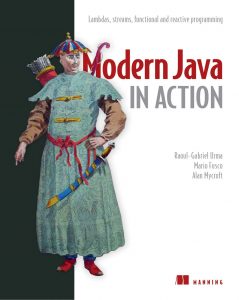
Modern Java in Action, by Raoul-Gabriel Urma, Mario Fusco, and Alan Mycroft, is a comprehensive guide to the Java language and its use in modern software development. Updated for Java 8, 9, and beyond, this book takes a practical approach to teach you how to use Java effectively. You’ll learn how to process data with streams and lambdas, write concurrent code safely and efficiently, and apply functional programming techniques to more complex problems. This edition also covers the new Java Module System and enhanced concurrency features in Java 9.
The Modern Java in Action book offers a good way to learn about this language, which is through practice. Unlike the Java: Programming Basics for Absolute Beginners which just has about 50 pages of practice questions, the Modern Java in Action book goes the extra mile to provide quality practice questions and hands-on questions. The practical approach allows you to learn by doing, not only by reading. The book also has a wide range of modern topics that will benefit you.
What we liked:
- Covers modern Java features like lambdas, streams, and Java Module System;
- Practical approach;
- Clear examples;
- Includes new features of Java 8, 9, and more;
- Easy to read.
What could be better:
- The book doesn’t go in-depth.
Features:
- Author: Herbert Schildt
- Publisher: McGraw Hill
- Publication date: November 23, 2021
- Edition: 12th
- Print length: 1280 pages
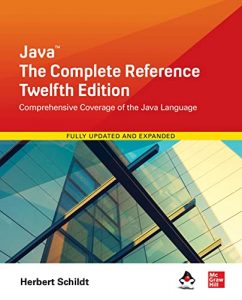
Java: The Complete Reference is our next best book for learning Java. This book explains how to develop, compile, debug, and run Java programs. Best-selling programming author Herbert Schildt covers the entire Java language, including its syntax, keywords, and fundamental programming principles. You’ll also find information on key portions of the Java API library, such as I/O, the Collections Framework, the stream library, and the concurrency utilities. Swing, JavaBeans, and servlets are also examined in depth.
The Java: The Complete Reference offers a wide range of modern topics on the latest trends and tools for Java, making it similar to Effective Java, which is our Editor’s Choice. But, the latter goes the extra mile by covering a wider range of topics that intermediate developers can take advantage of, as it is not suitable for beginners.
What we liked:
- Covers Java SE 17;
- Teaches to develop, compile, debug, and run Java programs;
- Comprehensive presentation of Java with its syntax, keywords, and main programming principles;
- Includes I/O, the Collections Framework, the stream library, and the concurrency utilities;
- Swing, JavaBeans, and servlets are examined;
- Explanation of records, sealed classes, and switch expressions;
- Up-to-date.
What could be better:
- Very thick.
Features:
- Author: Cay Horstmann
- Publisher: Pearson
- Publication date: February 1, 2019
- Edition: 11th
- Print length: 1040 pages
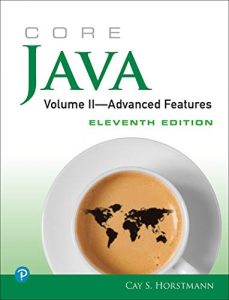
Looking to take your Java skills to the next level? Core Java Volume II is your perfect guide. With over 1,000 pages of content, this book covers everything from advanced topics like generics and lambda expressions to concurrency and networking. Written by Cay Horstmann, a leading Java expert, and educator, this edition provides clear, step-by-step explanations that will help you master even the most complex concepts.
The Core Java Volume covers all you need to know about Java, which is the ideal choice for experienced developers. Unlike Java: Programming Basics for Beginners and JavaScript: The Definitive Guide, which we named the Best for Beginners and Intermediate developers, this book is way more advanced with over 1000 pages of in-depth explanation of Java. If you think you have passed the intermediate stage, this book is for you. The book focuses on explaining Java SE 9, which gives readers modern features and tools that they can use.
What we liked:
- Covers advanced features of Java SE 9;
- Clear examples;
- Detailed.
What could be better:
- No exercises;
- Some buyers say they’ve received a damaged book.
Features:
- Author: Cay Horstmann
- Publisher: Oracle Press
- Publication date: December 21, 2021
- Edition: 12th
- Print length: 944 pages
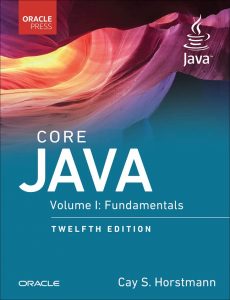
If you’re looking to get up to speed with Java, Core Java: Fundamentals is the perfect place to start. This comprehensive guide provides a solid foundation in the language, teaching you everything you need to write well-constructed Java code. You’ll learn how to use interfaces, lambda expressions, and inner classes; handle exceptions and debug programs; and make your code more reusable and efficient with generic programming. Plus, you’ll explore advanced topics like multicore processors and GUIs with Swing. With this book as your guide, you’ll be able to write robust Java code.
You can expand your knowledge of the Java language with the Core Java: Fundamentals book. The book is also for experienced developers like the Core Java Volume II, but this is more suitable for serious developers that want to write robust code. It offers an extensive guide and provides you with advanced topics, so you can use this to move forward in your coding journey. It also comes with realistic examples, which you don’t get with the Core Java Volume II book.
What we liked:
- A lot of examples;
- Detailed explanation of the language features;
- Covers Java 17;
- Teaches object-oriented programming, generics, collections, lambda expressions, concurrency, and functional programming.
What could be better:
- Thick.
Features:
- Author: Kathy Sierra, Trisha Gee, Bert Bates
- Publisher: O’Reilly Media
- Publication date: June 21, 2022
- Edition: 3rd
- Print length: 752 pages
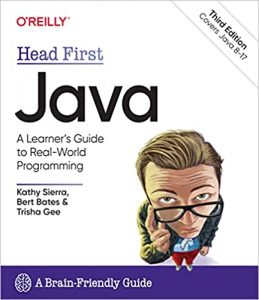
Head First Java: A Brain-Friendly Guide is one of the best books to learn Java. It features an engaging visual approach, with illustrations and photographs throughout that help students retain what they have learned. The book covers Java 8-17 and teaches the fundamentals of the language, as well as lambdas, streams, generics, threading, networking, and the desktop GUI. It’s a fast-paced yet thorough introduction to the language, so you can get up to speed in no time. With this book, you will avoid boring drilling and enjoy the process of mastering the language.
If you’re a visual learner, you should definitely consider using the Head First Java: A Brain-Friendly Guide to learn. The book goes further than other options on our list as it covers Java 8 – 17. The Java: The Complete Reference, which we reviewed earlier, stops at Java SE 17, but with this visual book, you get an extensive range. The Head First Java book also comes with photographs and illustrations, which you will not find in this reference guide.
What we liked:
- Covers Java 8-17;
- Teaches Java’s fundamentals and lambdas, streams, generics, threading, networking, and the desktop GUI;
- Visual approach;
- Written in casual and easy-to-understand language;
- Fun and entertaining way of presentation;
- Many exercises and examples;
- Various learning styles;
- Beginner-friendly.
What could be better:
- The images are black and white.
Things to Consider
Learning Java can be a daunting task. It is a complex programming language with a lot of nuances and subtleties. However, with the right book, it can also be an enjoyable and rewarding experience.
About Java
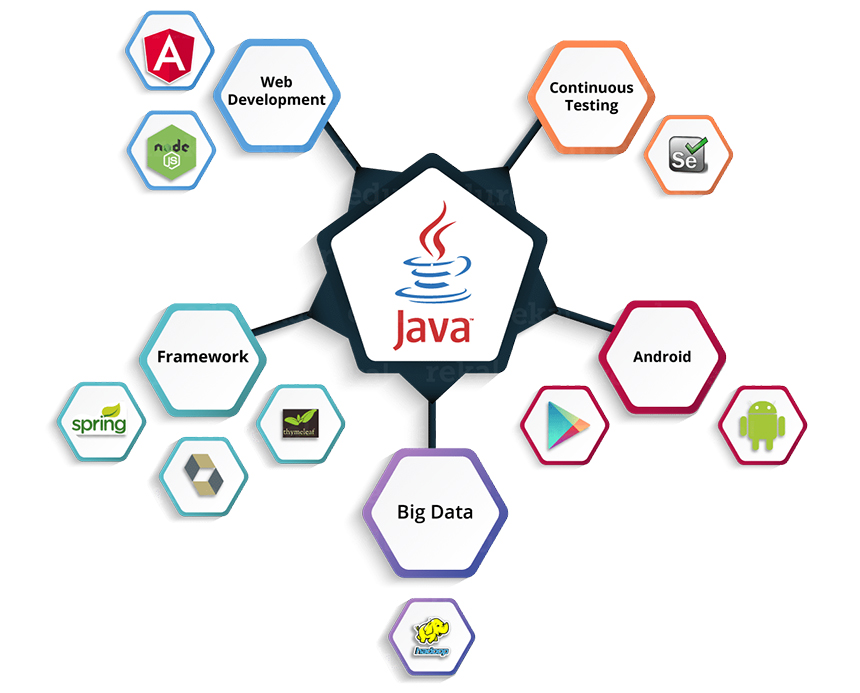
Java is a versatile and powerful programming language that enables developers to create robust, high-performance applications. According to Oracle (the largest provider of database software), there are more than 3 billion devices that run Java.
The Java syntax is similar to C++, but it is not backward-compatible with C++. Java semantics is based on the concept of objects and classes. However, in contrast to C++, Java does not support multiple inheritances.
Java is platform-independent, which means that applications written in Java can run on any device that supports the Java Runtime Environment (JRE).
Why Use Books for Learning Java?
Books are one of the best way to learn Java (or any programming language, for that matter). They provide a structured and comprehensive approach to learning.
A good Java book will not only teach you the syntax and semantics of the language but also show you how to use its features to build robust and high-performance applications.
In addition, most Java books come with exercises and projects that allow you to practice what you’ve learned.
Besides books let you learn at your own pace and in your own time. You can read them at home, on the bus, or anywhere else you have a few spare minutes.
Java Advantages
- Platform independence: you can run Java applications on any device that supports the JRE due to Java’s byte code-compiled architecture
- Object-oriented: Java helps you structure your code in an efficient and reusable way
- Secure: Java applications are more secure than applications written in other programming languages because the Java runtime environment checks for malicious code
- Robust: Java applications are less likely to crash because the Java runtime environment performs memory management and garbage collection
- Multi-threaded: you can write Java applications that can perform multiple tasks simultaneously
- Dynamic: Java is a dynamic language that allows you to run code that is not statically type-checked
- Extensible: you can extend the Java platform by writing your own libraries and applications
FAQ
Is Java popular?
Yes, Java is one of the most popular programming languages in the world. According to the PYPL (Popularity of Programming Language Index), Java is currently the second most popular language (after Python).
What are the most popular Java IDEs?
There are many popular Java IDEs (Integrated Development Environments), such as IntelliJ IDEA, Eclipse, and NetBeans.
What is the difference between Java SE and Java EE?
Java SE (Standard Edition) is a free and open-source implementation of the Java platform. It is suitable for developing desktop, mobile, and web applications. Java EE (Enterprise Edition) is a commercial implementation of the Java platform. It is designed for developing large-scale, multi-tiered, distributed, and web-based applications.
Why is Java called the write once, run anywhere language?
This slogan was coined by Sun Microsystems (now Oracle) to describe the platform independence of Java applications. It means that once you write a Java application, you can run it on any device that supports the JRE.
Our Verdict
Our top pick, Effective Java by Joshua Bloch, is the third edition of the best-selling book that covers everything from basic programming concepts to advanced topics. You’ll learn how to write code that’s clear, concise, and efficient, and you’ll find plenty of helpful tips and examples along the way.
JavaScript: The Definitive Guide is our second best Java book. This book, updated for the 2020 edition, shows you how to write code that makes your websites and apps more interactive, making it ideal for coders of the intermediate level.
With Java: Programming Basics for Absolute Beginners, you will learn the basics in just 115 pages! This easy-to-follow guide is perfect for anyone with no programming experience. This book covers everything you need to get started.
References:
